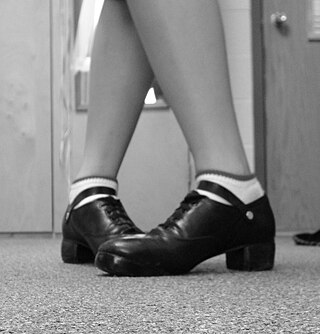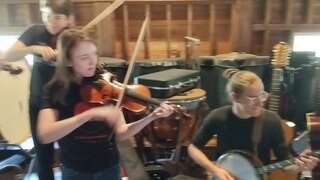
Contra dance is a form of folk dancing made up of long lines of couples. It has mixed origins from English country dance, Scottish country dance, and French dance styles in the 17th century. Sometimes described as New England folk dance or Appalachian folk dance, contra dances can be found around the world, but are most common in the United States, Canada, and other Anglophone countries.

"God Save the King" is the national anthem of the United Kingdom and the royal anthem of each of the British Crown Dependencies, one of two national anthems of New Zealand since 1977, and the royal anthem of most Commonwealth realms. The author of the tune is unknown and it may originate in plainchant, but an attribution to the composer John Bull has sometimes been made.

The reel is a folk dance type as well as the accompanying dance tune type. Of Scottish origin, reels are also an important part of the repertoire of the fiddle traditions of Britain, Ireland and North America. In Scottish country dancing, the reel is one of the four traditional dances, the others being the jig, the strathspey and the waltz, and is also the name of a dance figure.

A country dance is any of a very large number of social dances of a type that originated in the British Isles; it is the repeated execution of a predefined sequence of figures, carefully designed to fit a fixed length of music, performed by a group of people, usually in couples, in one or more sets. The figures involve interaction with your partner and/or with other dancers, usually with a progression so that you dance with everyone in your set. It is common in modern times to have a "caller" who teaches the dance and then calls the figures as you dance. Country dances are done in many different styles.

Scottish country dance (SCD) is the distinctively Scottish form of country dance, itself a form of social dance involving groups of couples of dancers tracing progressive patterns. A dance consists of a sequence of figures. These dances are set to musical forms which come from the Gaelic tradition of Highland Scotland, as do the steps used in performing the dances. Traditionally a figure corresponds to an eight-bar phrase of music.

Valarie McDermid, is a Scottish crime writer, best known for a series of novels featuring clinical psychologist Dr. Tony Hill, in a grim sub-genre known as Tartan Noir.

The schottische is a partnered country dance that apparently originated in Bohemia. It was popular in Victorian era ballrooms as a part of the Bohemian folk-dance craze and left its traces in folk music of countries such as Argentina, Finland ("jenkka"), France, Italy, Norway ("reinlender"), Portugal and Brazil, Spain (chotis), Sweden, Denmark ("schottis"), Mexico, and the United States, among other nations. The schottische is considered by The Oxford Companion to Music to be a kind of slower polka, with continental-European origin.
"Pop! Goes the Weasel" is a traditional English and American song, a country dance, nursery rhyme, and singing game that emerged in the mid-19th century. It is commonly used in Jack-in-the-box toys and for ice cream trucks.

A cèilidh or céilí is a traditional Scottish and Irish social gathering. In its most basic form, it simply means a social visit. In contemporary usage, it usually involves dancing and playing Gaelic folk music, either at a home or a larger concert at a social hall or other community gathering place.

"Auld Lang Syne" is a popular song, particularly in the English-speaking world. Traditionally, it is sung to bid farewell to the old year at the stroke of midnight on New Year's Eve/Hogmanay. By extension, it is also often heard at funerals, graduations, and as a farewell or ending to other occasions; for instance, many branches of the Scouting movement use it to close jamborees and other functions.

A gay bar is a drinking establishment that caters to an exclusively or predominantly lesbian, gay, bisexual, transgender or queer (LGBTQ+) clientele; the term gay is used as a broadly inclusive concept for LGBTQ+ communities.
A strathspey is a type of dance tune in 4
4 time, featuring dotted rhythms, which in traditional playing are generally somewhat exaggerated rhythmically. Examples of strathspeys are the songs "The Bonnie Banks o' Loch Lomond" and "Coming Through the Rye".

Gordon Haskell was an English musician and songwriter. A pop, rock, jazz, country and blues vocalist, guitarist, and bassist, he was a school friend of King Crimson guitarist Robert Fripp. The two first worked together in Fripp's mid-1960s teenage group the League of Gentlemen.
Bush dance is a style of dance from Australia, particularly where the music is provided by a bush band. The dances are mainly based on the traditional folk dances of the UK, Ireland and central Europe.
The Dashing White Sergeant is a Scottish country dance, performed to a similarly titled piece of music. The dance is in 4/4 time, thus it is in the form of a reel. The dance is performed by groups of six dancers and is progressive.
"Haste to the Wedding" is a jig tune in the English, Scottish and Irish musical traditions. The tune originated during the 18th century, although its original composer is not certain. Written in the standard 8-bar AABB format of Gaelic music, it is traditionally performed on the fiddle, but is a simple tune which can be performed on a variety of instruments, and is frequently adapted for session music. The tune has also been used as the basis for songs, and as musical accompaniment for ceili dances of the same name.
Events from the year 1923 in Scotland.

"Symphony" is a song by British classical crossover band Clean Bandit, featuring Swedish singer Zara Larsson. The song was released on 17 March 2017 as the second single from Clean Bandit's second studio album, What Is Love? (2018). It was also released on the same day as Larsson's second album So Good, where it was included as a bonus track. The single peaked at the top of the UK Singles Chart, becoming Larsson's first number one on the chart and Clean Bandit's third. Outside the United Kingdom, the single also topped the chart in Larsson's native Sweden, as well as in neighbouring Norway, in addition to being certified Diamond in France and Poland.

"Money Musk", alternatively "Monymusk" or other variations, is a contra dance first published in 1786. It was named after a 1776 strathspey by Daniel Dow which is played to accompany it, which itself was named after the House of Monymusk baronial estate. The dance features a central theme of reoriented lines, and is regarded as moderately difficult. It is still widely danced today, and is considered a traditional "chestnut".













